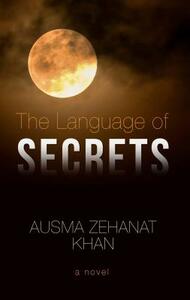Take a photo of a barcode or cover
Really enjoyed this. Police procedural that centres a practicing Muslim man, Esa, with Rachel, an athlete who’s thoughtfully navigating multiple intersections. CPS, a community policing effort with those two as partner, gets called in to investigate a childhood friend of Esa who is found murdered in the Algonquin woods. It turns out that this friend was a police officer embedded at a mosque where some of its members are planning a terrorist attach in Toronto.
There are so many things about this that make for a fantastic book. For one: it’s thoroughly researched and inspired by the Toronto18. Failings and successes of the police in those events allows for a highly compelling drama. It explores the differences in interpretations of the Qur’an, including historical contexts that are provided by Esa, as he has to navigate these really personal aspects to the case. It allows the reader to be educated about really politically fraught topics, which is needed. There is so much misinformation around Islam and Muslim culture in general. It made for really great reading. Plus, it paralleled the mandate of CPS, showcasing why diversity in action literally makes people better at their jobs. In this case it allowed for the police to solve what was going on. The ending just reinforced how real that struggle is too. Throughout Esa takes so much bullshit from coworkers.
Another subversion of the procedural genre is with Rachel too. She’s not just athletic, she’s an actual athlete. She eats all the time, stands up for what’s right, and routinely her views and thoughts lead to breakthroughs that are a team effort with Esa. It’s a very great pairing. And she serves as the a foil for people who aren’t aware of cultural issues and dynamics in the work place.
Love this series. Fantastic.
There are so many things about this that make for a fantastic book. For one: it’s thoroughly researched and inspired by the Toronto18. Failings and successes of the police in those events allows for a highly compelling drama. It explores the differences in interpretations of the Qur’an, including historical contexts that are provided by Esa, as he has to navigate these really personal aspects to the case. It allows the reader to be educated about really politically fraught topics, which is needed. There is so much misinformation around Islam and Muslim culture in general. It made for really great reading. Plus, it paralleled the mandate of CPS, showcasing why diversity in action literally makes people better at their jobs. In this case it allowed for the police to solve what was going on. The ending just reinforced how real that struggle is too. Throughout Esa takes so much bullshit from coworkers.
Another subversion of the procedural genre is with Rachel too. She’s not just athletic, she’s an actual athlete. She eats all the time, stands up for what’s right, and routinely her views and thoughts lead to breakthroughs that are a team effort with Esa. It’s a very great pairing. And she serves as the a foil for people who aren’t aware of cultural issues and dynamics in the work place.
Love this series. Fantastic.
I didn't realize this was the second book in a series. Probably would stand alone well if I understood better Canadian policing terms and more about Islam. Maybe these were explained a little more in the first book. Overall a good detective story however.
(3.75) I really love this series so far - it's got compelling mysteries and cultural themes, and the character development is great, especially for a mystery series. This one was a little harder for me to follow so I docked .25 of a star, but am looking forward to continuing with #3 soon!
I really enjoy these. They're well written mysteries, set in Toronto (and in a modern Toronto, too) and clearly Khan knows and loves the city.
Not as strong as her first. There were several moments in which someone realizes something important or is told something important in a conversation, and the reader is told that the revelation occurred but not its content, which is revealed later. That doesn't work for me. To me, it's the essence of clickbait - - "you won't believe what happens next!"
Also, a couple of characters shift personality traits abruptly to feed the plot rather than remaining true to themselves.
Also, a couple of characters shift personality traits abruptly to feed the plot rather than remaining true to themselves.
Real score 3.95. Slow to start but in the end I enjoyed it just as much as the first. But, ooh, they’re in trouble now I think.
This book brings back Esa Khattak and Rachel Getty, the police duo who handle minority sensitive cases. This time they are asked to investigate the murder of Mohsin Dar, Esa’s estranged friend who had infiltrated a Muslim terrorist cell planning an attack on Toronto. One of their problems is that greater value is “ascribed to the façade of Khattak’s investigation than to the actual truth it might uncover.” Another problem is that the man in charge of unravelling the terrorist plot bears a grudge against Khattak and so withholds information. Complications also arise when Rachel goes undercover as a potential Islam convert at a local mosque and when Khattak’s sister Ruksh becomes engaged to Hassan Ashkouri, the leader of the terrorist cell. Can the murderer be identified and arrested and the terrorist attack prevented?
As in the first novel in this series, it is the characterization of Khattak and Rachel that stands out. They behave consistently with the traits outlined in The Unquiet Dead. Their relationship develops further; the partnership is “expanding, deepening.” In this second book, Khattak’s divided loyalties are emphasized: he is torn between his Muslim faith and his role as a detective investigating members of his community. His actions are constantly being scrutinized and suspected by both his faith community and the police force.
The motives of the various members of the mosque are thoughtfully dissected. Readers will find themselves not agreeing with the actions of some of these people, but they will have a good understanding of their sometimes complex motivations. The author insists that the reader not equate Islam with terrorism by contrasting Khattak’s moderate views with those of Ashkouri: “It wasn’t enough to say that the same faith that had produced Hassan Ashkouri had also produced Esa Khattak, good and evil sketched out in broad strokes. It wasn’t easy and two-dimensional like that. It was nuanced, complex, difficult . . . Ashkouri had chosen a different path, a different means of addressing his anger and grievances, his choices vindicated by his reading of history. Something could be beautiful, humane, encompassing. Or it could be made ugly. And maybe that was the lesson. We bring to a tradition what is already within ourselves, however our moral compass is designed, whatever our ethical training is.”
The author also addresses the issue of moderate Muslims having to speak up. She has Khattak regretting that he didn’t always do so: “Times he should have spoken up, questions he should have asked, challenging others to an ethical reading of scripture in lieu of the tropes of dogma. It had seemed like a burden that someone else should carry, yet he realized it belonged to him, just as it belonged to each of his coreligionists, this personal quest for an ethical life – and it couldn’t be put down by choice, not without abandoning the field to the hardened and hidebound, whose rigid conservatism and eschewal of modernity contained with it the seeds of jihadist ideology.”
My reservations about the book revolve around the plot. There are some unrealistic elements. For example, Rachel admits that she is not really prepared for her undercover role: Choosing an undercover surname “was as far as she had gone in establishing her cover. Rachel possessed little previous undercover experience.” Why then would Khattak be “authorized to send [Rachel]” to the mosque in such a role? Wouldn’t the agency charged with gathering intelligence and ensuring national security be wary of sending in an amateur who could unwittingly make a terrorist cell aware of its being under surveillance? And perhaps I’m naïve but would a man in charge of bringing down a terrorist cell purposely withhold information because of his personal animosity towards Khattak, a tactic that could risk national security and the safety of innocent people? The secrets within policing are almost as dangerous as the secrets of the terrorist cell.
I appreciated the insight offered into Arabic poetry. For example, readers are told about the “well-established tradition of Arabic poetry, conflating the personal with the political.” Agha Shahid Ali, a Kashmiri poet, and Faiz Ahmad Faiz, a Pakistani poet, are mentioned more than once so I was inspired to do some research. Faiz, I discovered, was nominated four times for the Nobel Prize for literature.
Apparently a third book in the series is already being written. In an interview with Maclean’s magazine, the author said the following: “In my third book I send him to Iran, where Khattak, who’s from the same majority Sunni tradition as me, will be in the minority in a Shia country. I wanted him to examine the privilege of membership in a majority tradition, where you never have to think about the feelings or the traditions of the other and see what that feels like. I like to put him in situations where he’s uncomfortable, and has to examine his perspective and assumptions much more critically” (http://www.macleans.ca/culture/books/the-interview-crime-author-ausma-zehanat-khans-unique-lens-on-islam/).
The first two books of this series have sufficient strengths that I look forward to the third one.
Please check out my reader's blog (http://schatjesshelves.blogspot.ca/) and follow me on Twitter (@DCYakabuski).
As in the first novel in this series, it is the characterization of Khattak and Rachel that stands out. They behave consistently with the traits outlined in The Unquiet Dead. Their relationship develops further; the partnership is “expanding, deepening.” In this second book, Khattak’s divided loyalties are emphasized: he is torn between his Muslim faith and his role as a detective investigating members of his community. His actions are constantly being scrutinized and suspected by both his faith community and the police force.
The motives of the various members of the mosque are thoughtfully dissected. Readers will find themselves not agreeing with the actions of some of these people, but they will have a good understanding of their sometimes complex motivations. The author insists that the reader not equate Islam with terrorism by contrasting Khattak’s moderate views with those of Ashkouri: “It wasn’t enough to say that the same faith that had produced Hassan Ashkouri had also produced Esa Khattak, good and evil sketched out in broad strokes. It wasn’t easy and two-dimensional like that. It was nuanced, complex, difficult . . . Ashkouri had chosen a different path, a different means of addressing his anger and grievances, his choices vindicated by his reading of history. Something could be beautiful, humane, encompassing. Or it could be made ugly. And maybe that was the lesson. We bring to a tradition what is already within ourselves, however our moral compass is designed, whatever our ethical training is.”
The author also addresses the issue of moderate Muslims having to speak up. She has Khattak regretting that he didn’t always do so: “Times he should have spoken up, questions he should have asked, challenging others to an ethical reading of scripture in lieu of the tropes of dogma. It had seemed like a burden that someone else should carry, yet he realized it belonged to him, just as it belonged to each of his coreligionists, this personal quest for an ethical life – and it couldn’t be put down by choice, not without abandoning the field to the hardened and hidebound, whose rigid conservatism and eschewal of modernity contained with it the seeds of jihadist ideology.”
My reservations about the book revolve around the plot. There are some unrealistic elements. For example, Rachel admits that she is not really prepared for her undercover role: Choosing an undercover surname “was as far as she had gone in establishing her cover. Rachel possessed little previous undercover experience.” Why then would Khattak be “authorized to send [Rachel]” to the mosque in such a role? Wouldn’t the agency charged with gathering intelligence and ensuring national security be wary of sending in an amateur who could unwittingly make a terrorist cell aware of its being under surveillance? And perhaps I’m naïve but would a man in charge of bringing down a terrorist cell purposely withhold information because of his personal animosity towards Khattak, a tactic that could risk national security and the safety of innocent people? The secrets within policing are almost as dangerous as the secrets of the terrorist cell.
I appreciated the insight offered into Arabic poetry. For example, readers are told about the “well-established tradition of Arabic poetry, conflating the personal with the political.” Agha Shahid Ali, a Kashmiri poet, and Faiz Ahmad Faiz, a Pakistani poet, are mentioned more than once so I was inspired to do some research. Faiz, I discovered, was nominated four times for the Nobel Prize for literature.
Apparently a third book in the series is already being written. In an interview with Maclean’s magazine, the author said the following: “In my third book I send him to Iran, where Khattak, who’s from the same majority Sunni tradition as me, will be in the minority in a Shia country. I wanted him to examine the privilege of membership in a majority tradition, where you never have to think about the feelings or the traditions of the other and see what that feels like. I like to put him in situations where he’s uncomfortable, and has to examine his perspective and assumptions much more critically” (http://www.macleans.ca/culture/books/the-interview-crime-author-ausma-zehanat-khans-unique-lens-on-islam/).
The first two books of this series have sufficient strengths that I look forward to the third one.
Please check out my reader's blog (http://schatjesshelves.blogspot.ca/) and follow me on Twitter (@DCYakabuski).
challenging
mysterious
reflective
fast-paced
Plot or Character Driven:
A mix
Strong character development:
Yes
Loveable characters:
Yes
Diverse cast of characters:
Yes
Flaws of characters a main focus:
No




